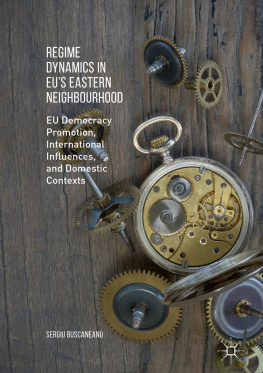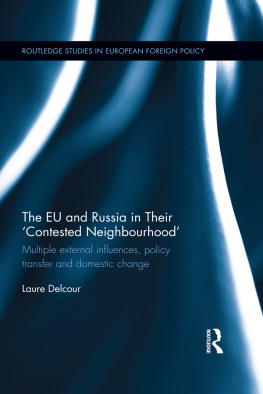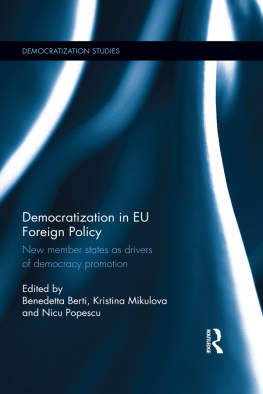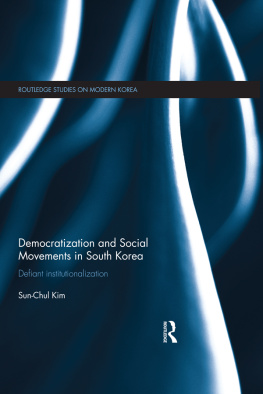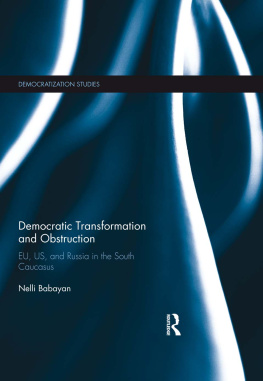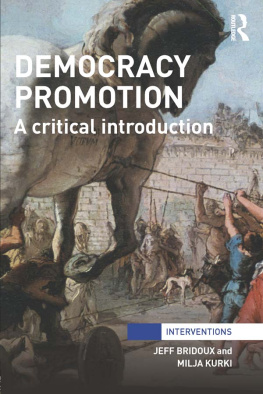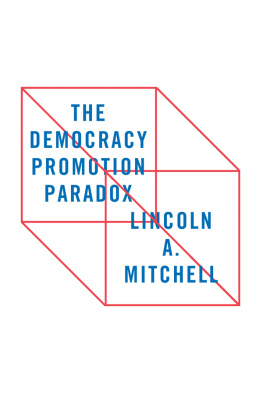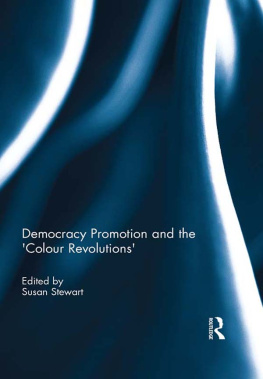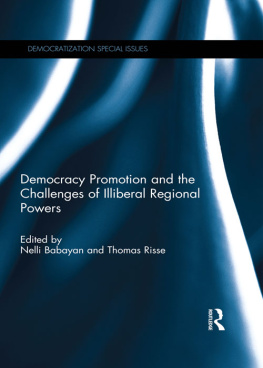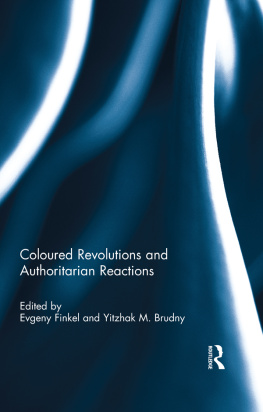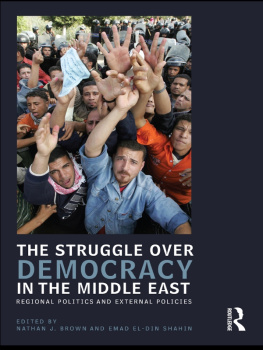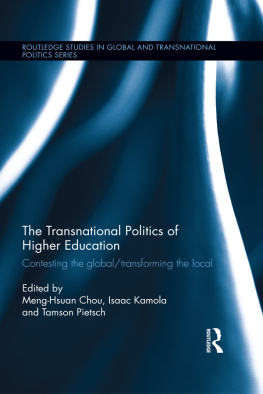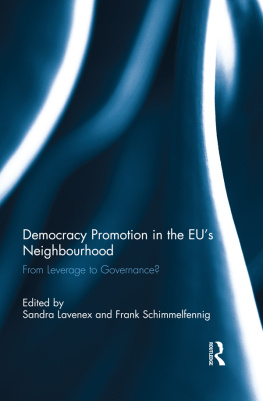1. Introduction
The Elephant and Democracy Promotion
Four decades ago, Donald J. Puchala was the first political scientist to use the story of the blind men and an elephant as a metaphor for distinct ways of understanding European integration. The story originated in India and traversed Hindu and Buddhist religious traditions, but it wasnt until several centuries after its initial telling that the American poet John Godfrey Saxe (18161887) introduced it to the West. There are more versions of the story. In one version, six blind men were asked to touch only one part of an elephant and from that, relay what the animal looked like. The first, who touched the leg, said it was like a pillar. The second felt the tail and concluded the animal was like a rope. The third felt the trunk, so he supposed it was like a tree branch. The fourth, who felt the ear, said the elephant was like a hand fan; the fifth touched the belly and stated that the animal was like a wall. Finally, the sixth felt the tusk, so his answer was a solid pipe. To anyone who has seen an elephant, the moral of the story is obvious: different perspectives can elicit completely different interpretations, but communication between divergent views is key to illuminating the reality. As long as we know today, after four decades since Puchalas () inspiring article, how the elephant looks like, the present book makes use of the same metaphor to ask whether this European animal has grown up to fulfil one ideal it stands for: democracy promotion.
Democracy promotion on the part of what we know today as the European Union (EU) is a relatively recent phenomenon; the EU has been actively involved in the industry of democracy promotion for a period of slightly more than two decades. Engagement with democracy promotion was part of a reluctant process, which brought this objective to the forefront of foreign policy agenda incrementally. The objective of democracy promotion was introduced for the first time in the EU documents (then Community) with the 1986 Declaration on Human Rights, in which member states expressed their commitment to promote and protect human rights and fundamental freedoms in third countries (European Commission ).
Beyond making the democratisation of CEEC a success story, the EU began to engage, albeit incrementally, in a parallel process of democracy promotion in other regions. Launched for Mediterranean countries in 1995, the Barcelona process has made the respect of human rights and fundamental freedoms an important condition for a multidimensional co-operation between the EU and countries in the region, though to a lesser extent than the EU enlargement process. The logic of political conditionality the EU used in relation to CEEC was later transplanted to guide efforts to stabilise the Western Balkan region. In addition, less demanding conditions concerning democracy, human rights and rule of law were inserted into the framework agreements and strategies on EU relations with third countries in Africa, Asia and Latin America.
As the EUs big-bang enlargement to the East became irreversible, the EU realised the necessity of reconsidering and upgrading its relations with the neighbourhood it was soon to acquire. Thus, in 2004, the European Neighbourhood Policy (ENP) was born from the EUs interest in fostering a ring of friends in the vicinity with whom it could enjoy close and fruitful relationships. The ENP was designed as a new policy approach to 16 proximate countries ). This aim is framed in the EU discourse as a win-win: the more stable and secure the vicinity of the EU is, the fewer risks for the EU. The philosophy of the EU hinges on the premise that democracy is a necessary ingredient for greater stability, prosperity and security. It is this credo that explains the EUs emphasis on upholding and promoting democratic values and practices in the EUs neighbourhood. To translate this philosophy in practice, the EU builds on its successful experience in contributing to the consolidation of democracy in CEEC and relies on the same mechanisms of influence it did in the context of Eastern enlargement. It conditions delivering the incentives offered within the ENP on compliance with international standards in the field of democracy, human rights and good governance. However, in contrast to accession countries, the membership perspectivethe most valuable EU rewardis not yet or at all on the table for ENP countries.
In the context of the ENP, scholars have asked whether the approach to democracy promotion under this policy can be effective in the absence of membership perspective as the top prize for a successful transformation (Cremona ).
Other scholars address particular governance and policy dimensions and paint a more nuanced picture with regard to the EUs record in terms of promoting its rules in the neighbourhood. Freyburg et al. (), gives evidence that compliance with EU policies occurs despite high costs, limited capacities and the lack of EU membership perspective. However, this issue deals with rule adoption in policy sectors that do not have a direct impact on the parameters of political regimes and leave out two crucial cases: Azerbaijan and Moldova.
In spite of notable contributions to the literature on the EUs democratising role in its neighbourhood, it is worth reengaging what represents the overarching question of the present book: (Q) Under what domestic and international conditions the EU has an influence on political regimes in its Eastern neighbourhood? This exploration starts from a limitation of existing literature to juxtapose in the same analytic design the EU influence with the role of alternative international (non-EU) and domestic factors. Leverage of and linkage with (non-EU) OECD countries, as well as transnational democratic diffusion need to be accounted for in order to discriminate against external European and non-European influences. Moreover, there are good reasons to assume that political regimes in Eastern ENP countries are also influenced by (to use the same analytic categories) the leverage of and linkage with the Russian Federation. This is not a prosaic phenomenon to be dismissed, but one that has noticeable consequences for the nature of political regimes in Russias near abroad. The dramatic Ukrainian crisis in 20142015 has fully confirmed this phenomenon. In those situations where the interaction between EU-related, international and domestic factors is engaged (cf. Korosteleva ), the research leaves out some influential cases, which can contribute to a richer causal story.
However, before the above overarching question is approached, three more narrow questions are specified to address distinctively: EU role, international influences and domestic contexts. The influence of the EU is interrogated with the following question: (Q1) To what extent has the EU eastward democracy promotion approach under the ENP been effective and consistent? To be sure, this question is not entirely new, but it is worth reconsidering in a research design that: (a) juxtaposes three distinct contingencies; (b) employs a regional coverage; (c) selects an extended time frame; and (d) opts for a mixed-method approach.
In the same vein, modernisation theory, historical (neo)institutionalism and action theory offer precious insight into the dynamics of political regimes, and therefore there is a need for systematic attempts to juxtapose EU democracy promotion and international (non-EU) influences with domestic socio-economic structures, political institutions, actors and their cost-benefit calculations. Again, these are not trivial contingencies to be left out of analyses concerned with regime dynamics. With a view to mitigate this limitation, the present book also inquires: (Q2) To what extent are regime parameters in Eastern ENP countries explained by the influence of international (non-EU) democratic factors? and (Q3) Under what domestic conditions are Eastern ENP countries likely to be receptive to EU democracy promotion efforts? One can expect a more adequate specification of the EUs democratising role if it is isolated from and judged against the causal weight of alternative domestic and external contenders.

